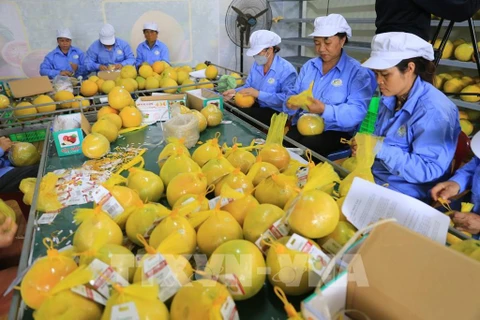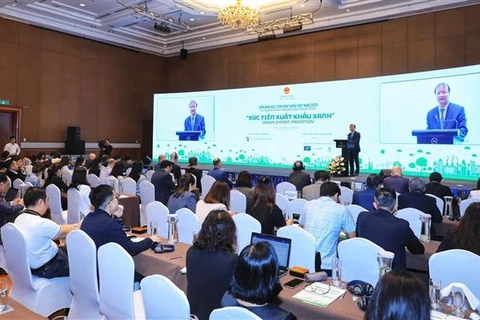 The Vietnam Export Forum 2023 on green export promotion is held by the Ministry of Industry and Trade on November 24 in Hanoi (Photo: VietnamPlus)
The Vietnam Export Forum 2023 on green export promotion is held by the Ministry of Industry and Trade on November 24 in Hanoi (Photo: VietnamPlus) Hanoi (VNA) – Transforming exports to go green and adapt to international standards is a vital factor for the Vietnamese economy, heard a forum on green export promotion held by the Ministry of Industry and Trade (MoIT) in Hanoi on November 24.
To avoid being eliminated from the game by high environmental and social standards set by import markets, exporting countries need to pay more attention to the "greenness" of supply chains.
Dr. Nguyen Phuong Nam, an international evaluator of greenhouse gas emissions inventory of the United Nations Framework Convention on Climate Change (UNFCCC), said the Carbon Border Adjustment Mechanism helps countries respond to climate change better, and ensure fair competition for goods exported to Europe.
There are six industries affected by this mechanism, including cement, electricity, fertiliser, iron and steel, aluminum, and chemicals. However, only some specific goods in the above-mentioned groups are impacted by this mechanism when exported to the EU.
Nam said that with CBAM, in the short term, businesses may have to endure additional administrative procedures on import and export activities. But in the long run, compliance to the rule will help increase the competitiveness of these industries and bring more surplus value to Vietnamese products.
The expert underlined the need for all Vietnamese production industries to assess the current state of emissions, thus taking solutions to reduce CO2 emissions during the production process to create green products for export.
According to the Vietnam Steel Association (VSA), in the first nine months of 2023, its members’ sales reached 13.869 million tonnes, down 8% over the same period in 2022. They exported over 1.43 million tonnes, surging by 81% compared to the same period in 2022. Notably, from 2004 to October 2023, Vietnamese steel exporters encountered 73 foreign lawsuits.
 Clement Graf, Global Director of Swiss Import Promotion Programme (SIPPO) speaks at the forum.(Photo: VietnamPlus)
Clement Graf, Global Director of Swiss Import Promotion Programme (SIPPO) speaks at the forum.(Photo: VietnamPlus)
According to Dinh Quoc Thai, Vice Chairman and Secretary General of the VSA, Vietnam’s steel production scale has expanded since 2015 and reached a record in 2021. The output and quality meet domestic demand and export to over 30 countries.
By 2050, if Vietnam produces 51 million tonnes of steel, about 105.7 million tonnes of carbon will be emitted, exceeding standards in the National Climate Change Strategy for industrial processes, Thai said. This is a challenge and also a huge responsibility for the Vietnamese steel industry, he said.
Clement Graf, Global Director of Swiss Import Promotion Programme (SIPPO) said businesses need to act with clear goals and steps as well as clearly define the role and responsibility of the parties, and develop and build the capacity of different actors in the ecosystem.
Deputy Minister of Industry and Trade Do Thang Hai said green growth, green development, and the circular economy are becoming a global trend. It is a positive solution to cut greenhouse gas emissions, improve the resilience and creativity of economies. It is also important to work towards carbon neutrality and sustainable development.
Therefore, Hai said, it’s important not to be left behind by environmental and social standards in import markets. Exporting countries need to change their mindset and pay more attention to the greenness of supply chains and international trade.
Vu Ba Phu, Director of the MoIT’s Vietnam Trade Promotion Agency (VIETTRADE), said the ministry will coordinate with relevant ministries, sectors, localities, and international organisations to promote awareness for export businesses on green transformation. CBAM is also important, as is responsible business to access new requirements and quickly take advantage of opportunities brought about by these new regulations.
The MoIT will deploy a series of programmes with the coordination of international organisations to equip production sectors with knowledge and skills, especially those related to the six industries that CBAM refers to, he added./.






















